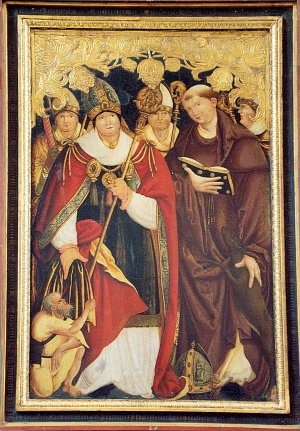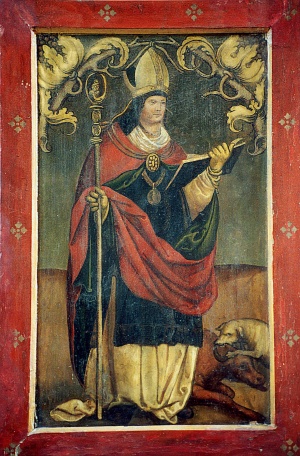Difference between revisions of "Animal Wiki:Altarpiece"
| (One intermediate revision by the same user not shown) | |||
| Line 1: | Line 1: | ||
[[Image:Mad_panou_central.jpg|thumb|300px|Greyhound]] | [[Image:Mad_panou_central.jpg|thumb|300px|Greyhound]] | ||
== The greyhound == | == The greyhound == | ||
| − | On the central panel, supported and patted by St. Dominic, is represented a black two-paw standing greyhound. The greyhound is the symbol of the Dominicans (created as jeux-de-mots of “Domini-canes”: the “dogs of God”) whose order was intended to preserve and guard the “true faith”. Usually, the greyhound symbolizing the Dominicans is a white black spotted dog (as in the frescoes of the Spaniard Chapel of Santa Maria Novella, Florence). In this particular case, the black dog is maybe a result of a later restoration of the painting. | + | On the central panel, supported and patted by St. Dominic, is represented a black two-paw standing greyhound. The greyhound is the symbol of the Dominicans (created as jeux-de-mots of “Domini-canes”: the “dogs of God”) whose order was intended to preserve and guard the “true faith”. Usually, the greyhound symbolizing the Dominicans is a white black spotted dog (as in the frescoes of the Spaniard Chapel of Santa Maria Novella, Florence). In this particular case, the black dog is maybe a result of |
| + | a later restoration of the painting. | ||
| + | |||
Latest revision as of 12:15, 10 December 2008
Contents
The greyhound
On the central panel, supported and patted by St. Dominic, is represented a black two-paw standing greyhound. The greyhound is the symbol of the Dominicans (created as jeux-de-mots of “Domini-canes”: the “dogs of God”) whose order was intended to preserve and guard the “true faith”. Usually, the greyhound symbolizing the Dominicans is a white black spotted dog (as in the frescoes of the Spaniard Chapel of Santa Maria Novella, Florence). In this particular case, the black dog is maybe a result of a later restoration of the painting.
The ox bitten by a white dog
The representation of these two fighting animals is an iconographic symbol on the panel figuring presumably St Albertus Magnus. This is a very unusual attribute. The standing saint, with episcopal insignia, is probably St. Albertus Magnus from the Dominican order, who defended the doctrine of another illustrious Dominican: Thomas Aquinas. The latter was also known as “the big ox” because of his impressive corpulence, and in this case the dog which is attacking the ox (i.e. Aquinas’ enemies in doctrinaire issues) is not the same as the Dominican greyhound.
References and Sources
Richter Gisela, Ottmar Richter. Siebenbuergische Fluegelaltaere. Innsbruck: Wort und Welt, 1992.
Roth, Victor. Siebenburgische Altaere. Strassburg: 1916
contributor: Irimescu, Elena, m04ire01@student.ceu.hu, Central European University
Documentary Notes
Panel Paintings from the altar of the "Main Church" (Bergkirche) in Sigishoara, Transylvania, Romania
Altar commissioned ca. 1515-1525

